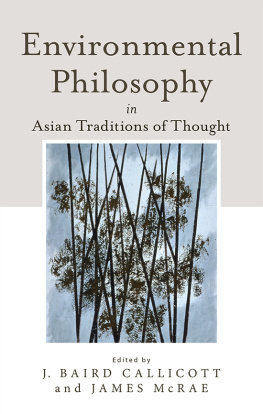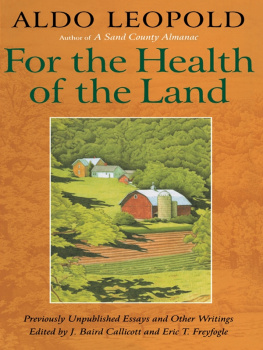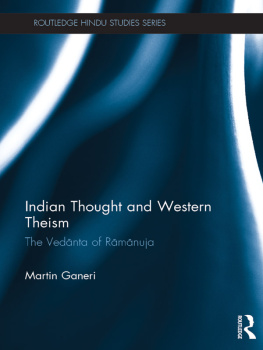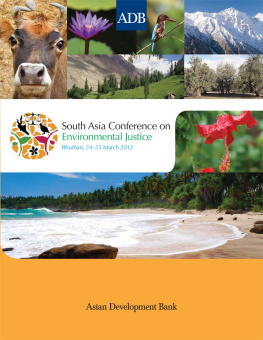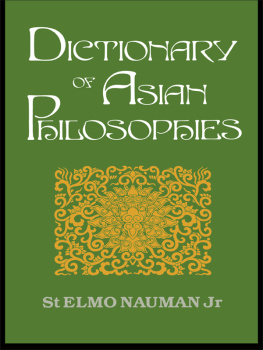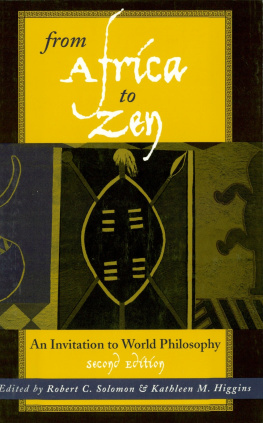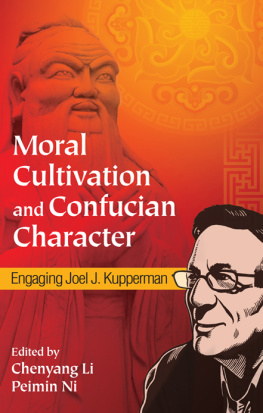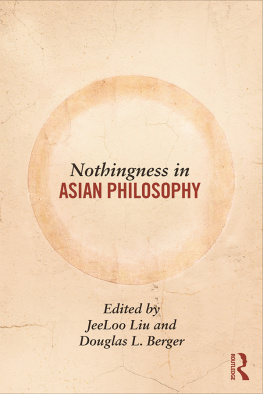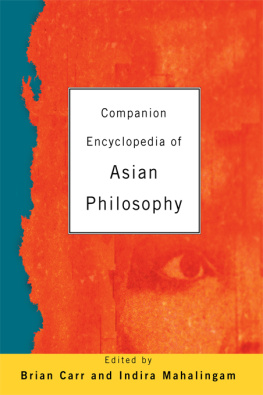We dedicate this book to Roger T. Ames:
A gifted scholar, a trusted friend, and an exemplar of Confucian virtue.
Mahalo nui loa.
Preface
Nature in Asian Traditions of Thought, edited by J. Baird Callicott and Roger T. Ames, was published by SUNY Press in 1989. It remains in print more than twenty years later. In the two decades that have since elapsed, the field of comparative environmental philosophy, which Nature in Asian Traditions of Thought inaugurated, has expanded and matured. Environmental Philosophy in Asian Traditions of Thought is conceived as a sequel to Nature in Asian Traditions of Thought. All eighteen papers included in this volume were written after 1989. All but four were originally published in widely scattered venues; those four exceptions appear here for the first time.
The idea for this book was conceived during September, 2007 in Fulton, Missouri at Westminster Colleges second Annual Symposium on Democracywhich was focused, that year, on the theme of The Environment: Prospects for Sustainability. J. Baird Callicott was a speaker at the symposium. James McRae, a member of Westminster Colleges Department of Classics, Philosophy, and Religious Studies, introduced Callicott and his talk for the symposium. After Callicotts talk, McRae mentioned that he used Nature in Asian Traditions of Thought as a textbook in his environmental ethics course. He also mentioned that he had written his doctoral dissertation under the direction of its co-editor, Roger Ames. Callicott was pleased to hear that. Its always good to know that ones books are taught in the classroom. And McRaes personal connection with Callicotts good friend and colleague was a pleasant surprise.
Personal pleasantries aside, Callicott thought that a companion volume to Nature in Asian Traditions of Thought, representing newer work in the field, would also be useful to students and their instructors. Just as important, it could synergistically juxtapose the best new work in comparative environmental philosophy and thus stimulate further development of the field. McRaes doctorate is from the worlds premier program in comparative philosophy at the University of Hawaii, where students receive rigorous training, including language training, in various traditions of Asian thought. Callicott believed that he had found in McRae the perfect co-editor for this volume. Callicott could bring his up-to-date expertise in environmental philosophy to the project, McRae could bring his in comparative philosophy. Moreover, for a second-generation bookthe son of Nature in Asian Traditions of Thought, as it werewhat could be better than for one of the editors to be a member of the second generation of comparative environmental philosophers? In subsequent correspondence, Callicott proposed the project and McRae agreed to be his co-editor.
We, Callicott and McRae, the aspiring editors of what would become this book, then began to look for work of exemplary quality by gifted and expert scholars. Of course, there was an embarrassment of riches and the hardest part of the editorial process was to boil down the list of potential items for inclusion. Those included would have to fit into a single volume and it was imperative that we make sure that those that made their way into the volume were the best of the lot. In the meantime, another one of Callicotts books, Earths Insights: A Multicultural Survey of Ecological Ethics from the Mediterranean Basin to the Australian Outback, was in process of being translated into Japanese. That book, first published in 1994, is based in part on the work of the scholars in Nature in Asian Traditions of Thought. The translation project introduced us to Tomosabur Yamauchi and Hiroshi Abe, two Japanese philosophers, who enthusiastically agreed to contribute essays to the collection. Yamauchis is published here for the first time.
Once we had made our selections, we organized them into a table of contents, drafted a prospectus, and sent both to Jane Bunker, then the Associate Director and Editor-in-Chief of the State University of New York Press, the publisher of Nature in Asian Traditions of Thought. She immediately saw the value of our proposed sequel and turned the project over to Nancy Ellegate, SUNY Presss acquisitions editor for Asian studies. We thank Ms. Bunker for her support for the project and Ms. Ellegate for her expert assistance in seeing the book through the process of production. In the meanwhile, Jane Bunker took a job at another press and was succeeded by co-Directors Donna Dixon and James Peltz, who generously helped move the project through the review process.
This anthology, as noted, contains both new articles and essays that were previously published in leading journals in the fields of environmental ethics and Asian and comparative philosophy:
- George Alfred Jamess Environment and Environmental Philosophy in India appears for the first time in this collection.
- Christopher Framarins tman, Identity, and Emanation: Arguments for a Hindu Environmental Ethic was first published in Comparative Philosophy 2.1 (2011): 324.
- Gandhis Contributions to Environmental Thought and Action by Bart Gruzalski was first published in Environmental Ethics 24 (2002): 22742.
- Stephanie Kazas Acting With Compassion: Buddhism, Feminism and the Environmental Crisis was first published in Ecotheology No 1 (July 1996): 7198.
- Against Holism: Rethinking Buddhist Environmental Ethics by Simon P. James was first published in Environmental Values 16 (2007): 44761.
- Causation and Telos: The Problem of Buddhist Environmental Ethics by Ian Harris was first published in the Journal of Buddhist Ethics 1 (1994): 4659.
- The Relevance of Chinese Neo-Confucianism for the Reverence of Nature by Mary Evelyn Tucker originally appeared in Environmental History Review, vol. 15, no. 2, Summer 1991.
- Beyond Naturalism: A Reconstruction of Daoist Environmental Ethics by R.P. Peerenboom originally appeared in Environmental Ethics 13 (1991): 322.
- Conceptual Foundations for Environmental Ethics: A Daoist Perspective by Karyn Lai first appeared in Environmental Ethics 25 (2003): 24766.
- Process Ecology and the Ideal Dao by Alan Fox was originally published in the Journal of Chinese Philosophy 32, no. 1 (2005): 4757.
- The Viability (Dao) and Virtuosity (De) of Daoist Ecology: Reversion (Fu) as Renewal by Sandra Wawrytko was first published in TheJournal of Chinese Philosophy 32, no. 1 (2005): 89103.
- James Millers chapter, Ecology, Aesthetics and Daoist Body Cultivation, appears in print here for the first time.
- The Japanese Concept of Nature in Relation to the Environmental Ethics and Conservation Aesthetics of Aldo Leopold by Steve Odin was first published in Environmental Ethics 13 (1991): 34560. It has also appeared in Mary Evelyn Tucker and Duncan Ryken Williams anthology, Buddhism and Ecology (Harvard University Press, 1997).
- Dgen, Deep Ecology, and the Ecological Self by Deane Curtin first appeared in Environmental Ethics 16 (1994): 195213.
- Conservation Ethics and the Japanese Intellectual Tradition by David Shaner and R. Shannon Duval first appeared in Environmental Ethics 11 (1989): 197214.
- From Symbiosis (Kysei) to the Ontology of Arising Both from Oneself and from Another Gsh by Hiroshi Abe first appeared in Interdisziplinre Phnomenologie 4 (2007): 109129.
- Tomosabur Yamauchis chapter, The Confucian Environmental Ethics of Ogy Sorai, appears in print for the first time in this volume.
- James McRaes Triple-Negation: Watsuji Tetsur on the Sustainability of Ecosystems, Economies, and International Peace was presented at the Tenth East-West Philosophers Conference in 2011 and appears in Roger T. Ames and Peter Hershocks anthology, Value and Values: Economics and Justice in an Age of Global Interdependence (University of Hawaii Press, 2014).
Next page
